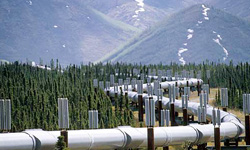Pakistani Cabinet Reiterate Support for IP Gas Pipeline


The Pakistani cabinet formally approved and supported completion of Iran-Pakistan gas pipeline which will help meet Pakistan’s energy crisis.
An official statement said that the Pakistani cabinet on Wednesday gave approval to Government’s Cooperation agreement with the Government of Iran on the engineering, procurement and construction work along with financing for the Iran – Pakistan Gas Pipeline Project (Pakistan segment).
A committee consisting of ministers for finance, law and justice, petroleum and national resources and the Governor State Bank of Pakistan was formed to further analyze the project, it said.
Demand for natural gas in Pakistan has outstripped supply in recent years, putting existing reserves under immense pressure.
The total consumption of natural gas in the country stands at 3480 MMCFD million cubic feet per day of which the power sector consumes 959 mmcfd, with 747 mmcdf being consumed in the domestic sector. Meanwhile 578 mmcfd of gas is consumed by the fertilizer industry, four mmcfd by the cement industry. While 107 mmcfd is consumed commercially. 327 mmcfd is consumed by CNG cylinders which are widely installed in locally manufactured vehicles in Pakistan.
The 2700-kilometer long pipeline was to supply gas for Pakistan and India which are suffering a lack of energy sources, but India has evaded talks. Last year Iran and Pakistan declared they would finalize the agreement bilaterally if India continued to be absent in the meetings.
According to the project proposal, the pipeline will begin from Iran’s Assalouyeh Energy Zone in the south and stretch over 1,100 km through Iran. In Pakistan, it will pass through Baluchistan and Sindh but officials now say the route may be changed if China agrees to the project.
The gas will be supplied from the South Pars gas field in the Iranian southern province of Bushehr. The initial capacity of the pipeline will be 22 billion cubic meters of natural gas per annum, which is expected to be later raised to 55 billion cubic meters. It is expected to cost $7.4 billion.
Iran has already built more than 900 kilometers of the pipeline on its soil.







